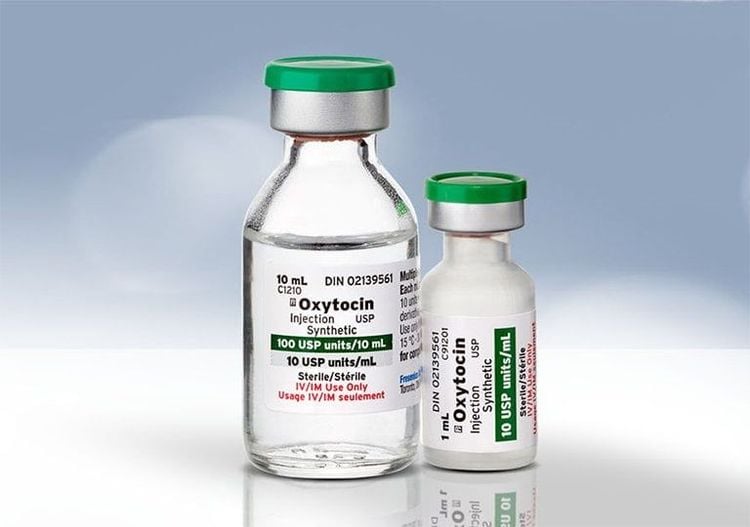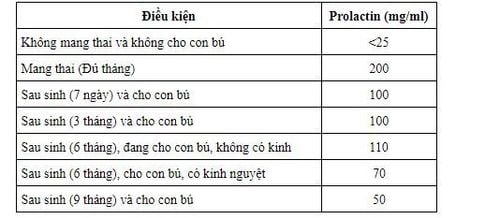This article was professionally consulted by - Obstetrician and Gynecologist - Department of Obstetrics and Gynecology - Vinmec Phu Quoc International General Hospital.
Although exclusive breastfeeding is a good temporary birth control method, you can still get pregnant when you have just given birth and are breastfeeding.
1.What are the chances of getting pregnant while breastfeeding?
Exclusive breastfeeding is a pretty good form of temporary birth control. In fact, it has its own name: the lactational amenorrhea method (LAM).
According to experts, out of 100 women who use LAM correctly in the first 6 months after giving birth, only 1 to 2 of them will get pregnant.
If you are using LAM and want to be part of the majority of women who do not get pregnant while breastfeeding, here is what you should do:
Exclusively breastfeed. That means delaying the introduction of solid foods early and avoiding supplementing with formula or anything else.
Feed on demand. Monitor your baby's need for breast milk and let them feed when they want, at least every 4 hours during the day and every 6 hours at night. Bottle-feeding is not a suitable alternative to LAM.
Avoid using a pacifier. Instead, let your baby satisfy his or her suckling needs by snuggling up to you and letting him or her suck.

Remember that for LAM to be effective, your period (including bleeding) must not have returned and your baby must be under 6 months old.
When you breastfeed, your body produces the hormone oxytocin. This multi-functional hormone not only makes you feel relaxed and generally happy, but it is also responsible for your milk let-down reflex (the feeling of fullness that occurs just before your milk lets down).
Oxytocin also helps prevent ovulation by sending signals to the brain to block the main hormone that stimulates ovulation. No ovulation means no pregnancy.
When your baby breastfeeds, the act of sucking on your nipple also stimulates the nerves in and around your nipple to send that message to your brain. However, pumping does not have the same effect.
In addition to oxytocin, your body produces more of the hormone prolactin due to the stimulation of your nipples during breastfeeding. Higher levels of prolactin mean a decrease in your fertility. This hormone also prevents ovulation and prevents menstruation from occurring. Prolactin levels are highest at night and right after you wake up.
A woman's prolactin levels will vary depending on whether she is pregnant, how far along she is in her postpartum period, and whether she is breastfeeding. Here is a sample chart to give you an idea of how prolactin levels vary:

If you are breastfeeding and hope to be among the 98% of women who successfully use LAM as a method of birth control, here is what you need to know:
- For LAM to work, you need to be exclusively breastfeeding. If you supplement your baby’s diet with formula or even pumped breast milk and feed it to your baby in a bottle, your chances of ovulating and getting pregnant increase.
- Once your baby is 6 months old and starts eating solid foods, your chances of ovulating increase.
- One study found that women who returned to work and were doing both LAM and pumping to exclusively breastfeed were more likely to get pregnant than non-working mothers who were doing LAM.
It is important to note that once your period returns, you are more likely to get pregnant. However, keep in mind that some women ovulate even before they have their first period after giving birth. Others start menstruating before they start ovulating. So there is no one rule that applies to all women.
Trắc nghiệm: Bạn có hiểu đúng về dấu hiệu mang thai sớm?
Các dấu hiệu mang thai sớm không phải chỉ mỗi trễ kinh mà còn có rất nhiều dấu hiệu khác như xuất huyết âm đạo, ngực căng tức,… Điểm xem bạn biết được bao nhiêu dấu hiệu mang thai sớm thông qua bài trắc nghiệm này nhé!
2. Signs of Pregnancy While Breastfeeding
If you are pregnant while breastfeeding, you may experience some of the following symptoms:
Excessive Thirst
You may start to feel thirsty more often, and this is common when breastfeeding because your baby will consume a large portion of the fluids you take in. But if you are pregnant while breastfeeding, your thirst may increase because your baby will also need fluids and will draw them out of your body.
Fatigue
Fatigue is one of the common symptoms of pregnancy while breastfeeding. You may feel exhausted after even the smallest tasks. Simply doing the laundry or washing the dishes may be too much for you. Although fatigue usually starts towards the end of the first trimester, it can happen earlier for breastfeeding mothers.
Sore and tender breasts
This is one of the symptoms that you may be breastfeeding. However, if you suddenly feel increased sensitivity in your nipples or find that your nipples are more sore and painful after breastfeeding, it could be a sign of pregnancy.
Decreased milk production
If you notice a significant decrease in your milk supply and your baby is still hungry even after feeding normally, it could be because you are pregnant. This usually happens after about two months of pregnancy but cannot be completely ruled out in early pregnancy. Additionally, the taste of your breast milk may change if you are pregnant and this may become apparent when your baby refuses to feed or seems reluctant to feed.

Cramps
Crams that occur if you are pregnant can be quite serious. You may feel like your period is about to start and only have cramps that last. This can be a good sign of pregnancy, especially if it is accompanied by bleeding while breastfeeding.
Nausea or morning sickness
If you are pregnant while breastfeeding, you may experience increased nausea and morning sickness. Therefore, it is important to make sure that nausea or morning sickness does not prevent you from enjoying your food as you will need to provide nutrients for two babies, while also maintaining your own energy and health.
Increased hunger levels
As a breastfeeding mother, your hunger levels will definitely increase significantly. But if your hunger levels suddenly spike along with some of the other symptoms of pregnancy, it is very possible that you have conceived again.
Lumps in Your Breasts
Pregnancy, along with the many hormonal changes that occur after childbirth, can lead to the formation of different types of lumps in your breasts. These can range from blocked milk sacs called galactoceles to fluid-filled cysts and fibrous tissue called fibroadenomas.
3. Can you continue breastfeeding while pregnant?

Yes. But make sure you are getting enough calories to support yourself, your baby, and your developing fetus. Aim for an extra 500 calories a day if your baby is eating other foods than your milk, and an extra 650 calories if your baby is under 6 months old.
You will also need to increase your calories by 350 calories in the second trimester and 450 calories in the third trimester. Sounds complicated? Make it easier for yourself by listening to your body and making healthy food choices.
If you have had a miscarriage or often give birth early, pay attention to uterine contractions. You may feel cramps when your baby feeds. This is because your body releases small amounts of oxytocin, and this hormone causes contractions. If you are concerned about the risk of premature birth, discuss this with your obstetrician or midwife.
Don't be surprised if your baby starts to refuse breast milk after the first few months of pregnancy. Your milk supply may decrease and the taste of your breast milk may change. Some of these changes may cause your baby to refuse breast milk and eventually wean themselves.
On the other hand, some parents successfully breastfeed throughout their pregnancy and are able to continue breastfeeding their newborn and older children. In these cases, the baby's need for breast milk should always be the highest priority.
Although breastfeeding is safe during pregnancy, there are some cases where weaning is recommended:
- If you have a high-risk pregnancy or are at risk of preterm labor
- If you are carrying twins
- If you have been advised to avoid sex during pregnancy
- If you are experiencing bleeding or uterine pain
If you experience these symptoms, talk to your doctor to determine if weaning is an option for you, your baby, and your unborn baby.
Mothers who need contraception while breastfeeding should avoid hormonal contraceptives. However, there are hormonal contraceptives (progestin only) that do not affect breast milk and can be chosen. Mothers also need to consider the need for contraception and the need to breastfeed completely or not completely, and the time to apply the appropriate measures for themselves. If you have unusual symptoms, you should be examined and consulted with a specialist.
To arrange an appointment, please call HOTLINE or make your reservation directly HERE. You may also download the MyVinmec app to schedule appointments faster and manage your reservations more conveniently.
References: parenting.firstcry.com, nhs.uk, americanpregnancy.org







